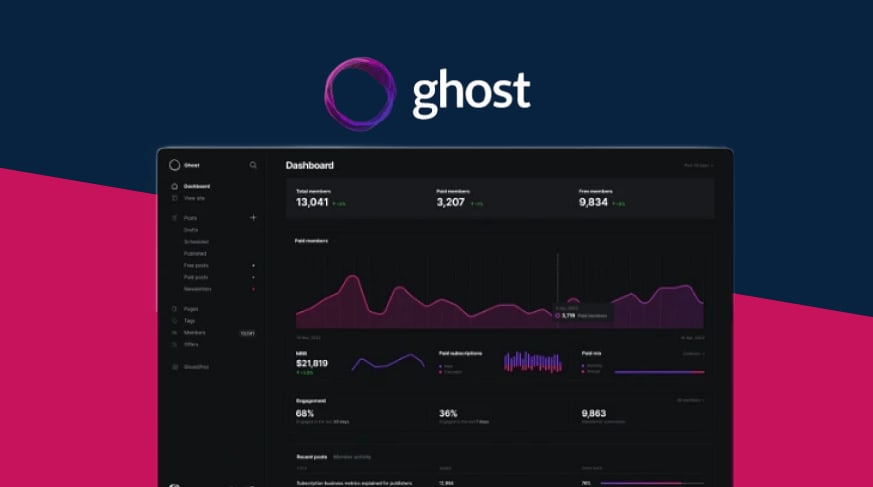Hey, this is Arian. I've been blogging for over 10 years, and I've used a variety of different content management systems (CMS) over the years. I've been happy with most of them, but I've always felt like there was something missing.
A few months ago, I decided to migrate my blog to Ghost CMS. Blog migration is the process of transferring a blog from one platform to another CMS. That’s why I chose Ghost CMS. Ghost is a newer CMS that's designed for professional bloggers and publishers. It's fast, lightweight, and easy to use. But what really sold me on Ghost was its focus on SEO and social sharing.
In this blog post, I'll share the reasons why I chose Ghost CMS to migrate my blog. I'll also discuss some of the benefits I've experienced since making the switch.
Overview of the content, In this blog you will known:
- Why Migrate?
- What is the Ghost CMS?
- Why did I Choose Ghost CMS?
- Benefits of Using Ghost CMS
- Tips for Migrating to Ghost
- Conclusion
- FAQs
Why Migrate?

Migrating a blog might be a smart decision to improve the overall performance and administration of your website. The motives for migrating differ from individual to person, but some common reasons include:
- Improved Features: A new CMS upgrade might grant access to advanced features and functionalities that were lacking in the previous system.
- Enhanced User Experience: The user experience of your blog may be greatly enhanced with a carefully built CMS, which will make it simple for readers to explore and interact with your content.
- Better Performance: A faster and better-performing CMS may decrease loading times for websites, improving the user experience and search engine results.
- Enhanced Security: Your blog's security is of the highest importance. Your website may be shielded from potential attacks and weaknesses by switching to a CMS with strong security features.
- Flexibility and Scalability of Ghost CMS: You could need a CMS that provides more flexibility and scalability as your blog expands to meet your changing demands.
What is the Ghost CMS?

Ghost is a headless CMS. It is a free and open-source blogging platform, and it uses modern technology like Node.js for high performance.
When getting started with Ghost, you’ll need to decide between Ghost (Pro) and self-hosted Ghost CMS. Ghost (Pro) offers a managed hosting solution with automatic updates, security, and built-in support, making it ideal for those who want a hassle-free blogging experience.
On the other hand, self-hosted Ghost CMS gives you full control over customization, performance tuning, and hosting, but requires technical knowledge for setup and maintenance. Choosing the right option depends on your experience, budget, and long-term blogging goals.
If you are looking for a powerful and flexible blogging platform, Ghost is a great option. It is simple to use, yet powerful enough to meet the needs of even the most demanding users.
Some of the features of Ghost include:
- A simple and intuitive user interface
- A powerful content management system
- A flexible and scalable architecture
- A wide range of themes and plugins
- A strong community of developers and users
Why did I Choose Ghost CMS?
A self-hosted alternative for bloggers and content creators is offered by the open-source software Ghost CMS. Due to its focus on simplicity, performance, and convenience of use, it has grown in popularity recently. Here are a few explanations for why I decided to migrate my blog to Ghost CMS:
- Superior Performance: The amazing performance of Ghost CMS is well recognized. It is created to be quick and lightweight, resulting in quicker page loads and a better user experience. My blog's overall performance significantly increased once I switched to Ghost CMS.
- Easy to use: Ghost is very easy to use, even if you're not a developer. You can create and manage your blog without having to write any code.
- Themes and plugins: Ghost comes with lots of themes and plugins. This means you can modify your blog's look and perform exactly how you want it to.
- Performance: Ghost is a very lightweight CMS, which means that it can load quickly and efficiently, even on low-powered devices. This is important for both users and search engines.
- Simplicity: Ghost is very easy to use, even for people who aren't familiar with CMSs. The interface is clean and intuitive, and there are plenty of tutorials and documentation available online.
- SEO: Ghost was created with SEO in mind. The code is tidy and well-optimized, and there are several tools available to assist you in improving your site's search engine rating.
- Personalization: Ghost is highly customizable. You can change the look and feel of your site to match your brand, and you can add a variety of plugins and extensions to add new functionality.
- Enhanced Security of Ghost CMS: Every website owner's main priority is security. Ghost CMS takes security very seriously and offers built-in safeguards to guard your blog from any dangers. It periodically publishes updates and patches to fix security flaws, assuring the continued safety and security of your website.
Benefits of Using Ghost CMS
If you are looking for a powerful and flexible blogging platform, Ghost is a great option. It is easy to use while also being strong enough to suit the needs of even the most demanding users.
Here are some of the benefits of using Ghost CMS:
- Simplicity: Ghost is designed to be simple and easy to use, even for beginners. The user interface is simple and easy to use, and the documentation is extensive.
- Fast loading speeds: Ghost is built on Node.js, which is a very performant platform. This means that your blog will load quickly, even on mobile devices.
- Customization: Ghost is highly customizable. I can change the look and feel of my blog without having to write any code. This is great because I can make my blog look and feel exactly the way I want it to.
- Power: Ghost is a powerful CMS with a wide range of features. You can make your own post types, taxonomies, and fields. Plugins can also be used to enhance Ghost's capabilities.
- The flexibility of Ghost CMS: Ghost is a flexible CMS that can be used to create a wide variety of websites. It may be used to build a blog, a news website, or a portfolio.
- Community: Ghost has a large and active community of developers and users. There are many resources available that can help you get started with Ghost, and there are always people ready to help you if you get stuck.
If you are looking for a powerful and flexible CMS that is easy to use, Ghost is a great option.
Additionally, future blogging trends with Ghost CMS are evolving towards more dynamic content monetization, integrated membership models, and AI-powered content optimization. Ghost’s built-in membership and subscription features allow bloggers to generate revenue through premium content, while its Markdown-based editor and minimalistic design cater to writers who prioritize simplicity and speed.
As blogging continues to shift towards community engagement and monetization, Ghost CMS remains a leading choice for content creators who want flexibility, performance, and long-term growth.
Tips for Migrating to Ghost
- Back up your data: Make sure to back up the data from your previous CMS before moving on with anything else. Your pages, posts, photos, and other media are included in this.
- Choose a migration method: There are a few different ways to migrate your data to Ghost. You may manually transfer your data over, export it, and import it into Ghost, or utilize a migration plugin.
- Test your migration: It's crucial to test your blog after cms data migration to ensure everything is operating as it should. Verify that all of your pages, articles, photos, and other material are appearing properly.
- Update your permalinks: You must adjust your permalinks in Ghost if you are moving from another CMS. By doing this, you can be confident that your previous URLs will continue to function once you migrate.
- Customize your Ghost blog: After moving your data, you may begin modifying your Ghost blog. This includes picking a theme, including plugins, and setting up your preferences.
Conclusion
If you're looking for a fast, lightweight, and easy-to-use CMS for your blog, I highly recommend Ghost CMS. It's the perfect choice for professional bloggers and publishers who want to create a blog that loads quickly, ranks high in any SERPs, and gets shared on social media.
FAQs
Do you have any questions about Ghost CMS for your blog? We have answers to some frequently asked questions on the topic.
Is it difficult to migrate a blog from another CMS to Ghost CMS?
While transferring a blog might be difficult, Ghost CMS offers resources and details to help make the process easier. There are step-by-step guidelines available that outline how to transfer your content, images, and settings from different major CMS platforms.
Can I monetize my blog using Ghost CMS?
Absolutely! Ghost CMS offers several methods for monetizing your blog. You may include third-party advertising networks, create subscriptions or memberships, and even sell digital things straight from your website. Ghost CMS provides the flexibility and tools needed to properly monetize your blog.
What are the drawbacks of using Ghost CMS?
There are a few drawbacks to using Ghost CMS, including:
- The learning curve: Ghost CMS can be a bit difficult to learn if you're not familiar with Node.js or other programming languages.
- The cost: Ghost CMS is not free, and you'll need to pay for a hosting plan if you want to use it.
- The community: Ghost CMS is a relatively new CMS, so the community is not as large as some of the other CMS platforms.
What is the difference between Ghost CMS and WordPress?
Ghost CMS and WordPress are two of the most popular CMS platforms, but they have different strengths and weaknesses.
WordPress is a more mature platform with a larger community, but it can be slower and more complex than Ghost CMS. Ghost CMS is a newer platform with a smaller community, but it is faster and easier to use than WordPress.
Ultimately, the best CMS platform for you will depend on your specific needs and preferences.
How do I migrate my blog from another CMS to Ghost CMS?
There are several methods for moving your blog from another CMS to Ghost CMS. One option is to utilize a migration program such as GhostMigrator or you can hire us to do a big migration. Another option is to manually export and import your blog articles and material from your previous CMS into Ghost CMS.
